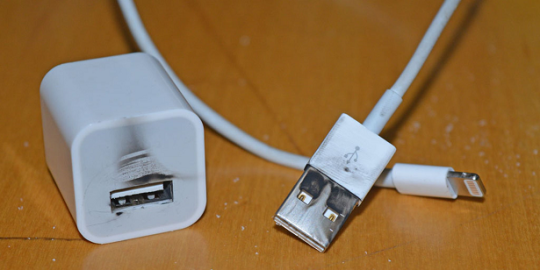
Apple recently filed a lawsuit against Mobile Star, claiming the company imprinted Apple logos on chargers and other accessories that “pose a significant risk of overheating, fire and electrical shock.” Apple also claimed that as many as 90% of the supposed Apple products being sold on Amazon were fakes.
It’s well-known that knockoff and counterfeit goods are a big problem in retail, with brands such as Forearm Forklift making the case that fakes sold on Amazon are severely damaging their businesses. These products can hurt legitimate manufacturers and create mistrust among consumers and retailers.
The RTP team debates whether Apple’s lawsuit will have a significant impact in scaring off other would-be fakers, and whether Amazon and other retailers should do more to root out counterfeit items on their shelves.
Debbie Hauss, Editor-in-Chief: If counterfeit producers believe they can make a profit and possibly get away with it, they will keep trying. Consumers will always seek out the least expensive price for the items they are looking for. That said, shoppers also are not willing to risk the personal safety of themselves or their loved ones, so if there is a clearly proven health risk, shoppers will shy away from that product and the brand. While Apple prices are high, I don’t think we can say the company “asked for it” when it comes to counterfeiting. Apple is an extremely successful business with a very loyal following. We may be a bit jealous but we just can’t say they deserve this type of criminal activity.
Adam Blair, Executive Editor: Retailers selling counterfeit items, whether knowingly or innocently, certainly didn’t begin with Amazon. There’s a reason caveat emptor, or “buyer beware,” comes to us from a language that originated thousands of years ago. But Amazon’s enormous scale means these fake, often low-quality and potentially dangerous items are available to many more consumers than ever strolled through an ancient bazaar. When the RTP editors first began discussing this as a possible topic for our Editor Q&A, I wasn’t particularly sympathetic to Apple, thinking “Well, it’s their own fault for pricing their products so high; of course consumers are tempted by cheap imitations.” But having read the CNBC story about Forearm Forklift, detailing the devastating impact that counterfeits sold on Amazon have brought to this small supplier, I’m seeing that this is a problem affecting companies of all sizes. At the very least, Amazon should use some of its enormous profits to better police its site, and those of its marketplace sellers, to keep as many fraudsters out as possible.
David DeZuzio, Managing Editor: My grandfather always said that it’s worth spending the extra money to get the best. And while it’s never fun to spend $80 on an adapter, the news from Amazon proves Grandpa right. Remember, if a deal sounds too good to be true, it likely is. But, you can’t necessarily fault shoppers for falling for these counterfeit scams. Would any Amazon shopper believe that 90% of any brand’s “genuine” offerings are fraudulent? It’s certainly up to Amazon to clean up its site and it’s more than a little surprising that the e-Commerce titan isn’t keeping a closer eye on who is officially licensed to sell a major brand’s products. Trust me, if someone in the Bezos family bought one of the fake Apple cables and inadvertently unleashed the optional fire hazard and electrocution features, he would quickly figure out a way to shut down every counterfeiter on the site. What’s unfortunate in these situations is that good, honest businesses lose out on sales and get lumped in with the crooks. There are probably more than a few shoppers out there now who don’t even trust the owner and inventor of Forearm Forklift, let alone the knockoff brands. Should buyers beware? Sure, but, marketplace retailers should also be vigilant to protect their customers.
Glenn Taylor, Senior Editor: When I first checked out the Forearm Forklift story I wasn’t sure whether it was going to be a sour grapes tale in which blame for a lack of success was deflected to a relatively minor problem, but after reading it in its entirety it shows how serious the issue of counterfeiting can be. Although Amazon wasn’t named in Apple’s lawsuit, its position as the top e-Commerce retailer puts it in a position where it has to take some kind of action going forward. This isn’t Craigslist we’re talking about here, or even Alibaba. As the face of e-Commerce within the U.S., Amazon needs to take responsibility for what is being sold both on its web site and its marketplaces; it can’t just be the Wild West out there. I do think that the Apple lawsuit’s publicity is a good thing because it is not an SMB but a household name that is taking legal action, ensuring that plenty of money will be behind the litigation. If Apple wins this, Amazon may have no choice but to clamp down on counterfeiting.
Klaudia Tirico, Features Editor: I hate to say I don’t sympathize with Apple on this one. But I am surprised that it took them this long to take action against counterfeits of its products. I understand you pay for the quality of products, and Apple electronics are great and worth their hefty price tag. But why charge your customers an additional $80 for replacements? For example, I purchased a MacBook Air three years ago, and just recently, the charger for it stopped working. After three years! To me, that and the fact that I had to pay $80 dollars for a new one is unacceptable. So I totally side with consumers who are looking for the cheapest option. In this case, I’m assuming that the fact that Mobile Star actually imprinted logos on chargers and other accessories is the reason for the suit. Of course, Apple doesn’t want their logo on a potentially dangerous product — that’s understandable. But being the mega e-Commerce retailer that it is, Amazon should figure out ways to filter out these “bad seeds” and notify customers that certain items are not associated with — in this case — Apple. Whether this suit will stop counterfeits of its products all together is highly unlikely, though. Unfortunately, fraudsters have a tendency to find loopholes, no matter how small they may be.






